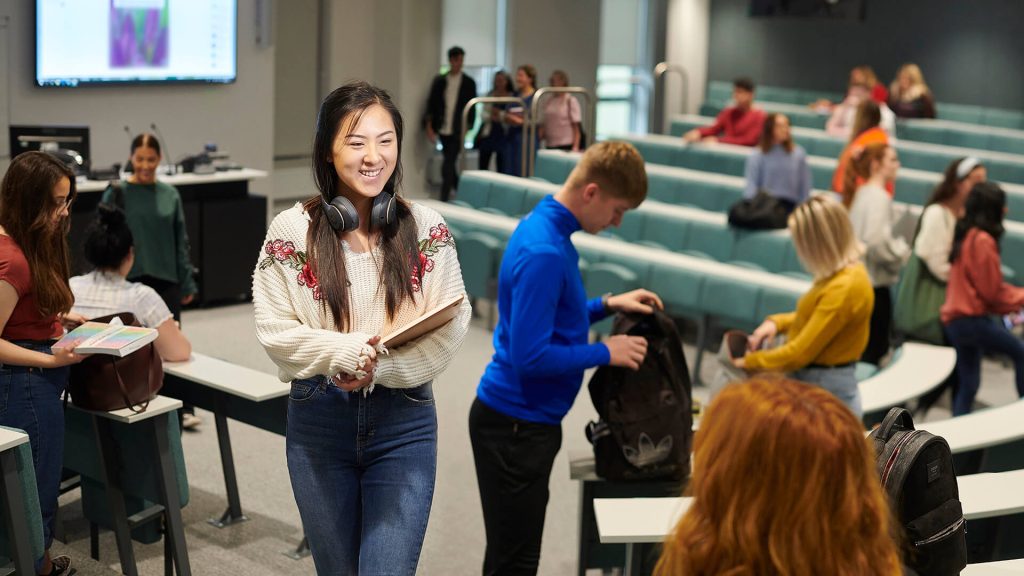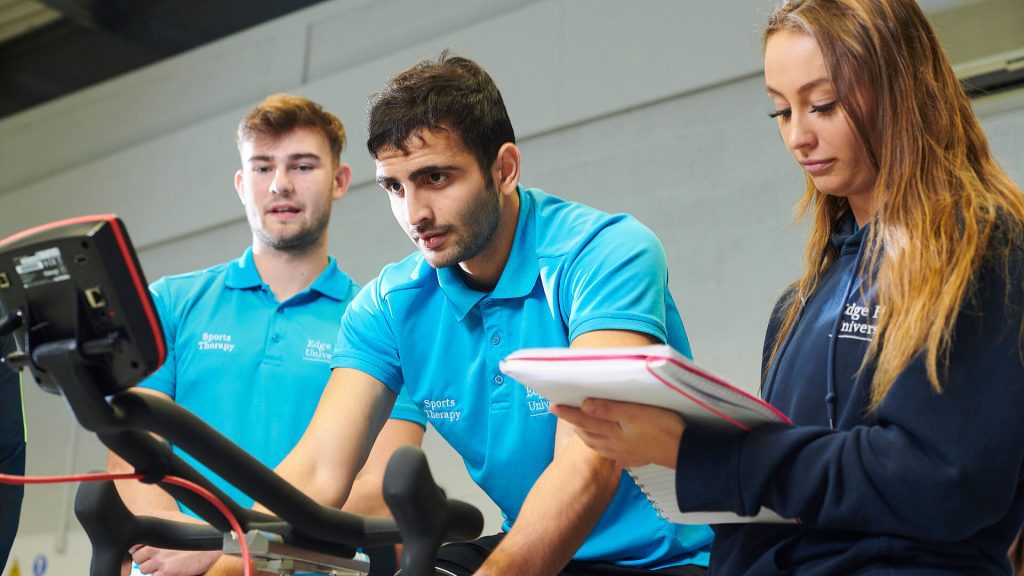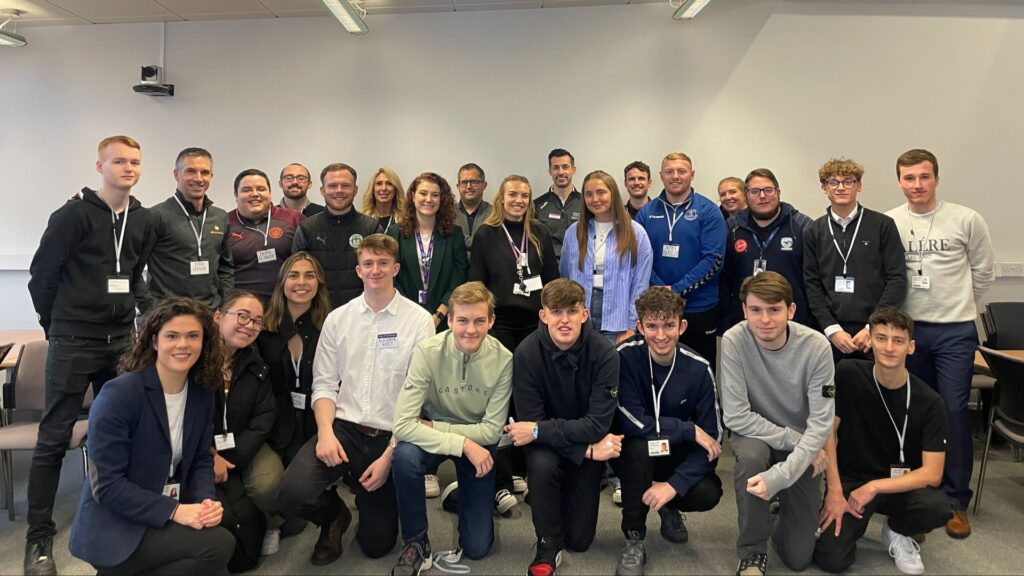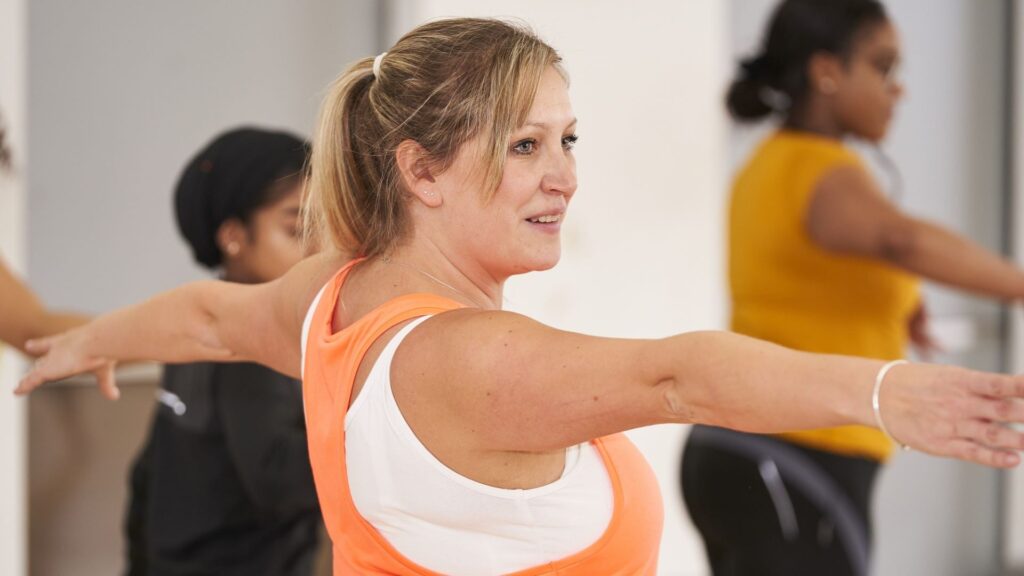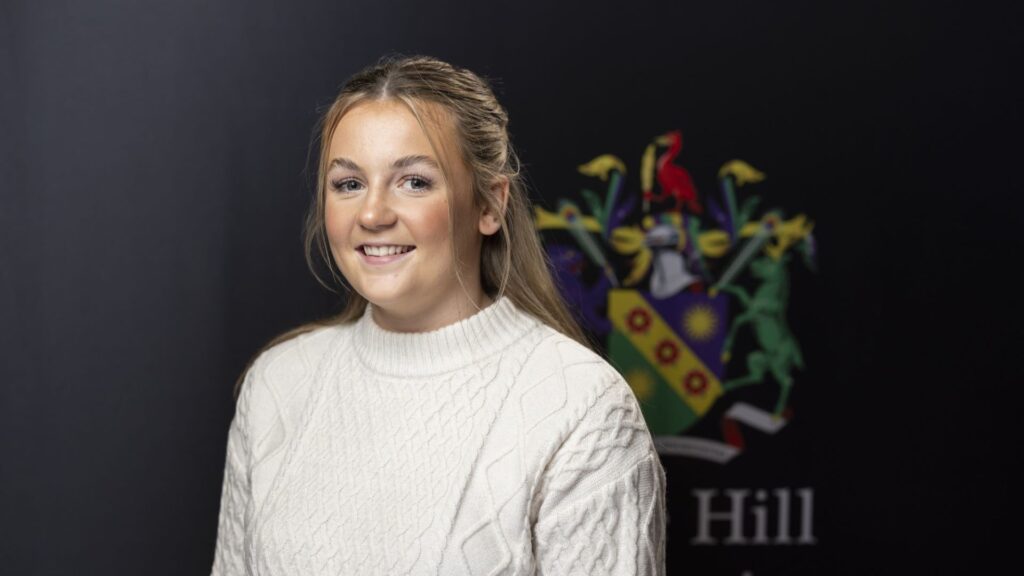Sport & Exercise Science BSc (Hons)
UCAS code: C602
Discover the science behind sport and exercise. Support practical action with solid theory, build your subject knowledge and learn how to develop a variety of training programmes. Join this degree, endorsed by BASES, the British Association of Sport and Exercise Sciences.
Overview
| Course length: | 3 years full-time |
|---|---|
| Start dates: | September 2024 September 2025 |
| Location: | Edge Hill University |
| Example offers: | BCC-BBC (A Level) or DMM (BTEC) View full entry criteria |
| Subject(s): | Sport and Physical Activity |
| Faculty: | Arts and Sciences |
| Department: | Sport and Physical Activity |
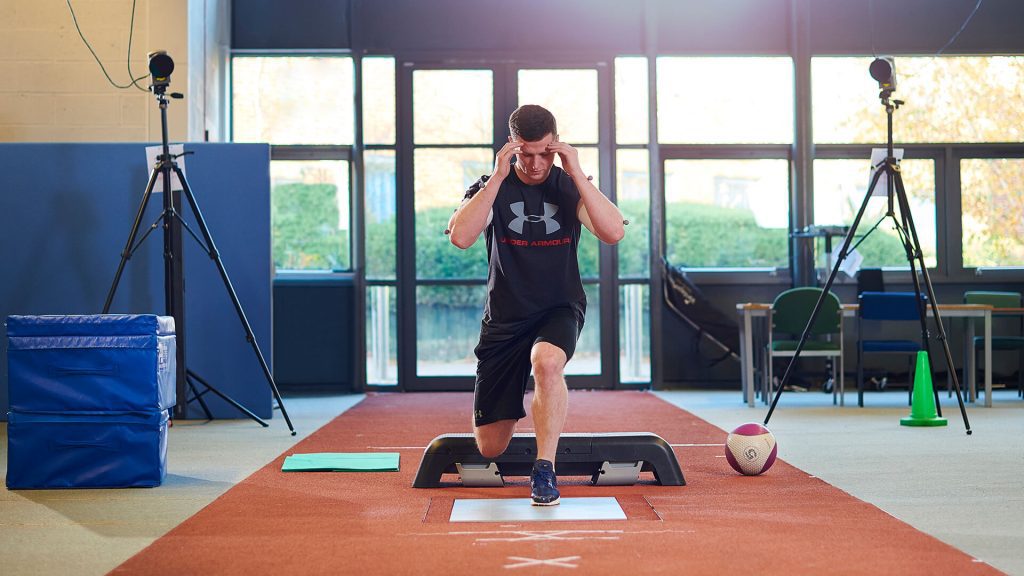
Endorsed by the British Association of Sport and Exercise Sciences, this degree covers the scientific principles that underpin sport and exercise performance. We’ll guide you through biomechanics, physiology and psychology.
Through your time on our sport and exercise science degree, you’ll understand why professional practice is key. This programme is multidisciplinary with plenty of opportunities to apply theory with practical exercises.
During your time with us you’ll make use of our outstanding facilities. See the theory in practice in our laboratories dedicated to physiology, biomechanics, psychology, strength & conditioning, functional rehabilitation and more. You’ll also have the chance to take your newly developed scientific skills into the field, utilising on-site facilities like sports halls, pitches, athletics track and swimming pool.
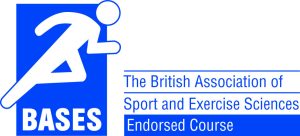
Course features
-
Professional accreditation
-
Professional practice placements
-
Sandwich year option available
-
Studying abroad option available
What you'll study
Build your fundamental knowledge of key sport and exercise science disciplines in Year 1. We’ll provide an introduction to topics such as physiology, nutrition, biomechanics and psychology. You’ll also learn about high performance sport, physical activity, exercise and health. There’s opportunity to refine the scientific writing skills that you’ll use time and time again during your studies at Edge Hill.
Year 2 is where you begin to apply your knowledge in more specialist scenarios. Continuing with core sport and exercise science subject areas, you’ll look closer at biomechanics, psychology and physiology and apply them to real sport and exercise scenarios. Alongside these, optional modules include training methods for high performance sport, the scientific principles of exercise and health, or nutrition. Research methods and skills will also become a focus to prepare you for Year 3.
The final year will be designed around your chosen pathway. You’ll select specialist modules in the area of study that you want to progress. If you opt for our generic pathway, you’ll choose from any of our optional specialist modules. There’s also a written dissertation and a real-world experience in a relevant professional placement. This final practical experience will set you up perfectly for your graduate career or further study.
Where your course includes optional modules, these are to provide an element of choice within the course curriculum. The availability of optional modules may vary from year to year and will be subject to minimum student numbers being achieved. This means that the availability of specific optional modules cannot be guaranteed. Optional module selection may also be affected by timetabling requirements. Some restrictions on optional module choice or combinations of optional modules may apply.
How you'll study
The degree takes a hands-on approach, with practical experience in our purpose-built and well-equipped biomechanics, physiology and psychology laboratories. You will also have lectures, small group seminars, tutorials, workshops, taught practical sessions and ICT based learning. For each module you will have a detailed booklet that tells you what sessions are about, what to read, how you will be assessed and coursework guidance.
In the final year of your degree you will be provided with the opportunity to gain experience of professional practice in sport and exercise science. This will be in an applied sport and exercise setting directly related to your chosen interests.
How you'll be assessed
You will be assessed through essays, projects and lab reports, critical analysis of papers, poster presentations, oral presentations, delivering practical workshop sessions and independent research. We use formal written examinations from time to time but they never account for more than 50% of the marks for any module.
Who will be teaching you
The Sport & Exercise Science team are highly experienced and enthusiastic with a real commitment to teaching sport and exercise sciences. Dynamic, friendly and supportive of your individual needs, staff are also actively involved in research and consultancy projects that influence the development of sport and exercise science and which directly feed into your degree.
Entry criteria
Entry requirements
Typical offer 104-112 UCAS Tariff points, preferably to include Physical Education or a Science subject.
Example offers
| Qualification | Requirement |
|---|---|
| A Level | BCC-BBC. |
| BTEC Extended Diploma (or combination of BTEC QCF qualifications) | Distinction, Merit, Merit (DMM). |
| T Level | Overall grade of Merit. |
| International Baccalaureate (IB) | We are happy to accept IB qualifications which achieve the required number of UCAS Tariff points. Subject-specific requirements at Higher Level (HL) Grade 5 may apply. |
| Access to Higher Education Diploma | 45 credits at Level 3, for example 9 credits at Distinction and 36 credits at Merit or 15 credits at Distinction and 30 credits at Merit. The required total can be attained from various credit combinations. |
Please note, the above examples may differ from actual offers made. A combination of A Level and BTEC awards may also be accepted.
If you have a minimum of two A Levels (or equivalent), there is no maximum number of qualifications that we will accept UCAS points from. This includes additional qualifications such as Extended Project Qualification (EPQ), AS Levels that haven't been continued to A Level, and General Studies AS or A Level awards.
English language requirements
International students require IELTS 6.0, with a score no lower than 5.5 in each individual component, or an equivalent English language qualification.
If your current level of English is half a band, one band, or one-and-a-half bands lower, either overall or in one or two elements, you may want to consider our Pre-Sessional English course.
How to apply
Apply full-time
Read our guide to applying through UCAS to find out more about the application process.
International
Please see our international student pages for further information about how to apply as a prospective international student.
Closed to international applications for September 2023.
Should you accept an offer of a place to study with us and formally enrol as a student, you will be subject to the provisions of the regulations, rules, codes, conditions and policies which apply to our students. These are available at www.edgehill.ac.uk/studentterms.
If you join a full time undergraduate degree at Edge Hill University, we will guarantee you the offer of a room in our halls of residence for the first year of your course.
Discover our accommodation
Facilities
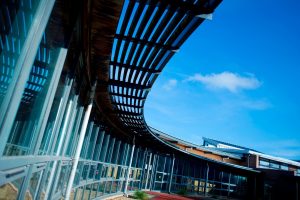 Based in the Wilson Centre, the Department of Sport and Physical Activity places a strong emphasis on practical work underpinned by outstanding facilities. There are dedicated laboratories in performance analysis, biomechanics, physiology, psychology, musculoskeletal, biochemistry, vision analysis, sleep, exercise and performance, and functional rehabilitation, as well as a sports therapy clinic.
Based in the Wilson Centre, the Department of Sport and Physical Activity places a strong emphasis on practical work underpinned by outstanding facilities. There are dedicated laboratories in performance analysis, biomechanics, physiology, psychology, musculoskeletal, biochemistry, vision analysis, sleep, exercise and performance, and functional rehabilitation, as well as a sports therapy clinic.
Extensive use is also made of the on-campus leisure facilities which include top-of-the-range 3G football and rugby pitches, hockey pitches, tennis courts, competition-standard athletics track and an athletics field. Our sports centre boasts a 25-metre swimming pool, double sports hall for badminton, basketball, netball and squash, a 100-station fitness suite, aerobics studio and a health suite with sauna and steam rooms.
Where you'll study
Wilson Centre
Sports Centre
Learning resources
The biochemistry laboratory enables you to collect and accurately analyse a wide range of metabolites, using the latest technology, to determine the physiological responses of athletes and others, to a variety of exercise stresses such as running, cycling and rowing.
Additional learning resources include high quality eye-tracking systems in a specialist vision analysis laboratory where you can measure hand-eye coordination, ocular-motor control, reaction times, cognition and other mechanisms associated with visual perception.
Musculoskeletal assessment tools combine with a dedicated strength and conditioning area in our MSk laboratory, while in the Sleep, Exercise and Performance laboratory you can measure the responses of individuals to sleep, sleep deprivation and changes in the circadian rhythms of a variety of biological processes.
Finance
Tuition fees
UK Full-Time
£9,250
a year
International
£16,500
a year
EU/EEA and Swiss students who have settled or pre-settled status under the EU Settlement Scheme, as well as Irish nationals, may be eligible for the UK tuition fee rate.
Financial support
Subject to eligibility, UK students joining this course can apply for a Tuition Fee Loan from the Government to cover the full cost of tuition fees. UK students enrolling on the course may also be eligible to apply for additional funding to help with living costs.
Please view the relevant Money Matters guide for comprehensive information about the financial support available to eligible UK students.
EU/EEA and Swiss students who have settled or pre-settled status under the EU Settlement Scheme may be eligible to apply for financial support. Irish nationals can ordinarily apply to Student Universal Support Ireland (SUSI). If you are an EU student who does not have settled or pre-settled status, or are an international student from a non-EU country, please see our international student finance pages.
Your future career
The course can lead to a broad variety of careers so there’s not a single typical route to follow. Predominantly students take on rewarding roles such as:
- sport and exercise scientists
- personal trainers
- strength and conditioning coaches
- fitness and health coordinators
- clinical exercise physiologists
- physical activity and mental health promotion specialists
- lifestyle managers
- GP referral scheme co-ordinators
- performance analysts
- graduate management training schemes
As well as working in the sports sciences, institutes of sport or national governing bodies of sport, past graduates have kickstarted their careers in variety of businesses including:
- Fleetwood Town FC
- ABL Health
- Blackpool FC
- University of Toronto Varsity Blues
- Liverpool Heart and Chest Hospital
- English Institute of Sport
- Leeds Teaching Hospital
Our students also have the opportunity to continue onto postgraduate study. And many train to become teachers with a PGCE in primary, secondary in physical education, or within further education.
Course changes
Every effort has been made to ensure the accuracy of this information, however our courses are subject to ongoing review and development. Changing circumstances may necessitate alteration to, or the cancellation of, courses.
Changes may be necessary to comply with the requirements of professional bodies, revisions to subject benchmarks statements, to keep courses updated and contemporary, or as a result of student feedback. We reserve the right to make variations if we consider such action to be necessary or in the best interests of students.
